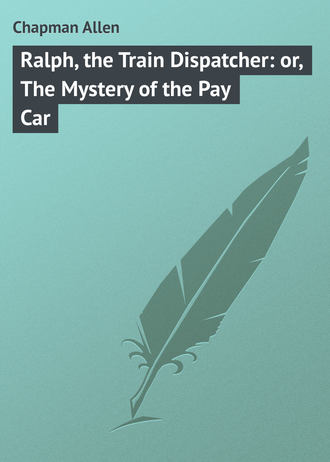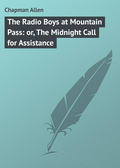
Chapman Allen
Ralph, the Train Dispatcher: or, The Mystery of the Pay Car
CHAPTER I – THE OVERLAND EXPRESS
“Those men will bear watching-they are up to some mischief, Fairbanks.”
“I thought so myself, Mr. Fogg. I have been watching them for some time.”
“I thought you would notice them-you generally do notice things.”
The speaker with these words bestowed a glance of genuine pride and approbation upon his companion, Ralph Fairbanks.
They were a great pair, these two, a friendly, loyal pair, the grizzled old veteran fireman, Lemuel Fogg, and the clear-eyed, steady-handed young fellow who had risen from roundhouse wiper to switchtower service, then to fireman, then to engineer, and who now pulled the lever on the crack racer of the Great Northern Railroad, the Overland express.
Ralph sat with his hand on the throttle waiting for the signal to pull out of Boydsville Tracks. Ahead were clear, as he well knew, and his eyes were fixed on three men who had just passed down the platform with a scrutinizing glance at the locomotive and its crew.
Fogg had watched them for some few minutes with an ominous eye. He had snorted in his characteristic, suspicious way, as the trio lounged around the end of the little depot.
“Good day,” he now said with fine sarcasm in his tone, “hope I see you again-know I’ll see you again. They’re up to tricks, Fairbanks, and don’t you forget it.”
“Gone, have they?” piped in a new voice, and a brakeman craned his neck from his position on the reverse step of the locomotive. “Say, who are they, anyway?”
“Do you know?” inquired the fireman, facing the intruder sharply.
“I’d like to. They got on three stations back. The conductor spotted them as odd fish from the start. Two of them are disguised, that’s sure-the mustache of one of them went sideways. The old man, the mild-looking, placid old gentleman they had in tow, is a telegrapher.”
“How do you know that?” asked Ralph, becoming interested.
“That’s easy. I caught him strumming on the car window sill, and I have had an apprenticeship in the wire line long enough to guess what he was tapping out. On his mind, see-force of habit and all that. The two with him, though, looked like jail birds.”
“What struck me,” interposed Fogg, “was the way they snooked around the train at the two last stops. They looked us over as if they were planning a holdup.”
“Yes, and they pumped the train hands dry all about your schedule,” declared the brakeman. “Cottoned to me, but I cut them short. Seemed mightily interested in the pay car routine, by the way.”
“Did, eh,” bristled up Fogg. “Say, tell us about that.”
“Why, you see-There goes the starting signal. See you again.”
The brakeman dropped back to duty, and the depot and the three men who had caused a brief ripple in the monotony of a routine run were lost in the distance. For a few minutes the fireman had his hands full feeding the fire, and Ralph, eyes, ears and all his senses on the alert, got in perfect touch with throttle, air gauge and exhaust valve.
Ralph glanced at the clock and took an easy position on his cushioned seat. Everything was in order for a smooth run to twenty miles away. The Overland Express was on time, as she usually was, and everything was in trim for a safe delivery at terminus.
Fogg hustled about. He was a restless, ambitious being, always finding lots to do about cab and tender. His brows were knitted, however, and every once in a while he indulged in a fit of undertoned grumbling. Ralph watched him furtively with a slight smile. He knew that his companion railroader was stirred up about something. The young engineer had come to understand the quirks and turns and moods of his eccentric helper, just as fully as those of his beloved engine.
“I say,” broke out Fogg finally, slamming down into his seat. “It’s about time for something to happen, Fairbanks.”
“Think so?” queried Ralph lightly.
“Been pretty smooth sailing lately, you see.”
“That’s the way it ought to be in a well-regulated family, isn’t it, Mr. Fogg?”
“Humph-maybe. All the same, I’m an old bird and know the signs.”
“What signs are you talking about, Mr. Fogg?”
“Our machine balked this morning when she took the turntable, didn’t she?”
“That was because the wiper was half asleep.”
“Thirteen blew out a cylinder head as we passed her-13, an unlucky number, see?”
“That’s an every-day occurrence since the high pressure system came in.”
“White cow crossed the track just back a bit.”
“Nonsense,” railed Ralph. “I thought you’d got rid of all those old superstitions since your promotion to the best job on the road.”
“That’s it, that’s just it,” declared the fireman with serious vehemence-“and I don’t want to lose it. Just as I say, since we knocked out the sorehead crew of strikers and made the big record on that famous snowstorm run on the Mountain Division, we’ve been like ducks in clear water, smooth sailing and the best on earth none too good for us. It isn’t natural. Why, old John Griscom, thirty years at the furnace, used to get scared to death if he ran two weeks without a broken driving wheel or a derail.”
“Well, you see we’re on a new order of things, Mr. Fogg,” suggested Ralph brightly. “They’ve put us at the top-notch with a top-notch machine and a top-notch crew. We must stay there, and we’ll do it if we keep our heads clear, eyes open and attend strictly to business.”
The fireman shook his head fretfully and looked unconvinced. Ralph knew his stubborn ways and said nothing.
The young engineer of the Overland Express was in the heyday of satisfaction and contentment. He was proud of his present position, and was prouder still because he felt that he had earned it through sheer energy and merit. As Fogg had declared, the appearance of the three men noted had something sinister about it, but the fireman was always getting rattled about something or other, fussy as an old woman when the locomotive was balky. Ralph insisted upon enjoying to the limit the full measure of prosperity that had come to him.
Both had fought hard to secure the positions they now held, however, and the mere hint of a break in the pleasant programme set them up in arms instanter. They had chummed together and had learned to love the staunch, magnificent locomotive that pulled the Overland Express as if it was a fellow comrade, and would have had a pitched battle any time with the meddler or enemy who plotted injury to the prize train of the Great Northern.
All this had not been accomplished without some pretty hard knocks. Looking back in retrospect now, Ralph could fancy his progress to date as veritable steps in the ladder of fortune. It had all rounded out so beautifully that it seemed like a dream. Now the thought of trouble or disaster reminded him gravely of the foes he had known in the past, and the difficult places he had battled through in his steadfast march to the front rank.
Ralph Fairbanks had taken to railroading as naturally as does a duck to water. His father had been one of the pioneer builders of the Great Northern. In the first volume of the present series, entitled “Ralph of the Roundhouse,” the unworthy scheme of Gasper Farrington, a village magnate, to rob Ralph’s widowed mother of her little home was depicted. That book, too, tells of how Ralph left school to work for a living and win laurels as the best engine wiper in the service.
Ralph’s next step up the ladder, as told in the second volume of this series, called “Ralph in the Switch Tower,” led to his promotion to the post of fireman. The third volume of the series, “Ralph on the Engine,” showed the routine and adventures of an ambitious boy bound to reach the top notch in railroad service.
The proudest moment in the life of the young engineer, however, seemed to have arrived when Ralph was awarded the crack run of the road, as told in the fourth volume of this series entitled “Ralph on the Overland Express.”
The reader who has followed the upward and onward course of the railroad boy through these volumes will remember how he made friends everywhere. They were all the better for his bright ways and good example. It was Ralph’s great forbearance and patience that overcame the grumpiness and suspicion of the cross-grained Lemuel Fogg and made of him a first-class fireman. It was Ralph’s kindly encouragement that brought out the inventive genius of a capital young fellow named Archie Graham, and helped Limpy Joe, a railroad cripple, to acquire a living as an eating house proprietor.
A poor waif named Van Sherwin owed his rise in life to the influence of the good-hearted young engineer, and Zeph Dallas, a would-be boy detective, was toned down and instructed by Ralph until his wild ideas had some practical coherency to them.
Ralph had his enemies. From time to time along his brisk railroad career they had bobbed up at inopportune junctures, but never to his final disaster, for they were in the wrong and right always prevails in the end. They had tried to upset his plans on many an occasion, they had tried to disgrace and discredit him, but vainly.
In “Ralph on the Overland Express” the young engineer did some pretty big things for a new man at the throttle. He carried a train load of passengers through a snowstorm experience that made old veterans on the road take notice in an astonished way, and he made some record runs over the Mountain Division that established the service of the Great Northern as a standard model.
All this success not only ranked in the minds of his enemies, but roused the envy and dissatisfaction of rival roads. For some time vague hints had been rife that these rivals were forming a combination “to put the Great Northern out of business,” if the feat were possible, so both Ralph and his loyal fireman kept their eyes wide open and felt that they were on their mettle all of the time.
Ralph’s last exploit had won him a high place in the estimation of his superiors. With every train out of Rockton stalled, he and Fogg had made a terrifying hairbreadth special run to Shelby Junction, defying floods, drifts and washouts, landing the president of the road just in the nick of time to catch a train on a parallel rival line.
The event had enabled that official to close an advantageous arrangement, in which time was the essence of a contract which gave the Great Northern the supremacy over every line in the district having transcontinental connections.
The Great Northern had won the upper hand through this timely but not tricky operation. Naturally, baffled, rival roads had been upset by the same. A revengeful feeling had extended to the employees of those lines, and the warning had been spread broadcast to look out for squalls, as the other roads had given the quiet tip to its men, it was understood, to take down the Great Northern a peg or two whenever occasion offered.
Of all this Ralph was thinking as they passed the flag station at Luce, and shot around the long curve guarded by a line of bluffs just beyond. The young engineer was thinking of home, and so was Fogg, for they were due in twenty-three minutes now.
Suddenly Ralph reached out for the lever lightning quick, and then his hand swept sand and air valves with the rapidity of an expert playing some instrument.
Crack!
Under the wheels of the big locomotive a detonating clamor rang out-always a vivid warning to the nerves of every wide-awake railroad man.
“A torpedo-something ahead,” spoke Ralph quickly.
“What did I tell you?” jerked out his fireman excitedly. “I felt it in my bones, I told you it was about time for something to happen.”
The young engineer steadied the locomotive down to a sliding halt like a trained jockey stopping a horse on the race track. The halt brought the nose of the locomotive just beyond the bluff line so that Ralph could sweep the tracks ahead with a clear glance.
“It’s a wreck,” announced the young engineer of the Overland Express.
CHAPTER II – THE WRECK
“A wreck, eh, – sure, I know it! Our turn next-you’ll see,” fumed Fogg, as the locomotive came to a stop.
“It’s a freight on the out track,” said Ralph, peering ahead. “Two cars over the embankment and-”
“For land’s sake!” interrupted the fireman, “whiff! whoo! what have we run into, anyway?”
A flying object came slam bang against the lookout window not two inches from Fogg’s nose. A dozen more sailed over the cab roof. With a great flutter half of these dropped down into the cab direct.
“Chickens!” roared Fogg in excitement and astonishment. “Say, did you ever see so many at one time? Where do they ever come from?”
“From the wreck. Look ahead,” directed Ralph.
It was hard to do this, for a second flock of fowls thronged down upon them. Of a sudden there seemed to be chickens everywhere. They scampered down the rails, crouched to the pilot, roosted on the steam chests, lined up on the coal of the tender, while three fat hens clucked and skirmished under the very feet of the fireman, who was hopping about to evade the bewildering inrush.
“I declare!” he ejaculated breathlessly.
Far as Ralph could see ahead, stray fowls were in evidence. Feathers were flying, and a tremendous clatter and bustle was going on. They came limping, flying, rolling along the roadbed from the direction of a train standing stationary on the out track. In its center there was a gap. Thirty feet down the embankment, split in two, and a mere pile of kindling wood now, were two cars.
The trucks of one of these and some minor wreckage littered the in track. Freight hands were clearing it away, and it was this temporary obstruction that had been the cause of the warning torpedo.
A brakeman from the freight came to the passenger train to report what was doing.
“Palace chicken car and a gondola loaded with boxes in the ditch beyond,” he said. “We’ll be cleaned up for you in a few minutes.”
“That’s how the chickens come to be in evidence so numerously, it seems,” remarked Ralph.
“Say, see them among the wrecked wire netting, and putting for the timber!” exclaimed Fogg. “Fairbanks, there’s enough poultry running loose to stock an eating house for a year. I say, they’re nobody’s property now. Suppose-here’s two fat ones. I reckon I’ll take that much of the spoil while it’s going.”
With a vast chuckle the fireman grabbed two of the fowls under his feet and dumped them into his waste box, shutting down the cover. The conductor of the freight came up penciling a brief report. He handed it to the conductor of the Overland.
“We’ll wire from Luce,” he explained, “but we may be delayed reaching there and you may get this to headquarters at the Junction first. Tell the claim agent there won’t be salvage enough to fill a waybill. She’s clear,” with a glance down the track.
The Overland proceeded slowly past the wreck, affording the crew and the curious passengers a view of the demolished freight lying at the bottom of the embankment. Once past this, Ralph set full steam to make up for lost time.
It put Fogg in better humor to arrive on schedule. The thought of home comforts close by and the captured chickens occupied his mind and dissipated his superstitious forebodings.
When they reached the roundhouse the fireman started straight for home. Ralph lingered a few minutes to chat with the foreman, and was about to leave when Fry, the claim agent of the road, came into the doghouse in great haste.
“Just the man I want to see, Fairbanks,” he said animatedly.
“That so?” smiled Ralph.
“Yes. Your conductor just notified me of the smashup beyond the limits. It looks clean cut enough, with the tracks cleared, but he says some of the stuff is perishable.”
“If you list chickens in that class,” responded Ralph, “I guess that’s right.”
“That’s the bother of it,” observed Fry. “Dead salvage could wait, and the wrecking crew could take care of it at their leisure, but-live stock!”
“It looked to me as if most of the chickens had got away,” exclaimed Ralph. “The car was split and twisted from end to end.”
“I reckon I had better get on the job instanter,” said the claim agent. “How about getting down to the bluff switch, Forgan?”
“Nothing moving but the regulars,” reported the roundhouse foreman. “You don’t need a special?”
“No, any dinky old machine will do.”
“Gravel pit dummy just came in.”
“Can’t you rig her up and give me clear tracks for an hour, till I make investigations?”
“Crew gone home.”
“No extras on hand?”
The foreman consulted his schedule and shook his head negatively.
Ralph thought of his home and mother, but a certain appealing glance from the claim agent and a natural disposition to be useful and accommodating influenced him to a kindly impulse.
“See here, Mr. Fry, I’ll be glad to help you out, if I can,” he said.
“You certainly can, Fairbanks, and I won’t forget the favor,” declared the claim agent warmly. “You see, I’m booked for a week’s vacation and a visit to my old invalid father down at Danley, beginning tomorrow. If I can untie all the red tape from this wreck affair, I’m free to get out, and my substitute can take up any fresh tangles that come up tomorrow.”
“Can you fire?” inquired Ralph.
“I can make a try at it.”
“Then I’ll see to the rest,” promised the young engineer briskly.
With the aid of wiper Ralph soon got the dummy ready for action. It was a long time since the young engineer had done roundhouse duty. He did it well now, and thanked the strict training of his early apprentice experience. The jerky spiteful little engine rolled over the turntable in a few minutes time, and the claim agent pulled off his coat and looked to Ralph for orders.
They took a switch and headed down the clear out track. At a crossing a man came tearing towards them, arms waving, long beard flying, and his face showing the greatest urgency and excitement.
“Mishter Fry! Mishter Fry!” he panted out, “I haf just heard-”
“Nothing for you, Cohen,” shouted the claim agent.
“I hear dere vas some boxes. Sthop! sthop! I’ve got the retty gash.”
“Ready-Cash Cohen,” exclaimed Fry to Ralph. “Always on hand when there’s any cheap wreck salvage lying around loose. That fellow seems to scent a wreck like a vulture.”
“I’ve heard of him,” remarked Ralph with a smile.
They had free swing on the out track until they neared the scene of the wreck. Here they took a siding and left the dummy, to walk to the spot where the two freight cars had gone over the embankment.
“Hello!” suddenly ejaculated the claim agent with tremendous surprise and emphasis.
“Excuse me, Mishter Fry, but that salvage-”
Ralph burst out into a hearty peal of laughter. Clinging to the little bobtail tender of the dummy was Ready-Cash Cohen.
“Well, you’re a good one, Cohen.”
“If I vas’nt, vould I be Chonny-on-de-spot, Mishter Fry?” chuckled Cohen cunningly.
He followed them as they walked down the tracks. When they reached the point where the two freights had gone over the embankment, Fry clambered down its slant and for some time poked about the tangled mass of wreckage below.
“Vill dere haf to be an appraisal, my tear friend?” anxiously inquired Cohen, pressing forward as the claim agent reappeared.
“No,” responded Fry shortly. “There’s a chicken car with live and dead mixed up in the tangle. Come, Cohen, how much for the lot?”
“Schickens?” repeated Cohen disgustedly-“not in my line, Mishter Fry. Schickens are an expense. Dey need feeding.”
“Won’t bid, eh?”
“Don’t vant dem at any price. But de boxes, Mishter Fry-vot’s in dose boxes?”
“See here,” observed Fry, “I’m not giving information to the enemy. There they are, badly shaken up but they look meaty, don’t they? If you want to bid unsight unseen, name your figure.”
“Fifty tollars.”
“Take them.”
The salvage dealer toppled down the embankment with a greedy promptness. The claim agent winked blandly after him.
“I expected it,” said Fry, as a minute later Cohen came toiling up the embankment his face a void of disappointed misery.
“Mishter Fry, Mishter Fry,” he gasped, “dey are looking glasses!”
“Found that out, did you?” grinned the freight agent.
“Dey vos smashed, dey vas proken, every last one of dem. Dey are not even junk. My tear friend, I cannot take dem.”
“A bargain’s a bargain, Cohen,” voiced Fry smoothly. “You’ve made enough out of your deals with the road to stand by your bid. If you don’t, we’re no longer your customer.”
“I von’t have dem. It was a trick,” and the man went down the track tearing at his beard.
“There’s kindling wood there for somebody free for the taking,” remarked Fry. “The chicken smashup isn’t so easy.”
“Many down there?” inquired Ralph.
“Yes, most of them are crushed, but a good many alive are shut in the wire tangle. The best I can do is to send a section man to pry them free. It’s heartless to leave them to suffer and to die.”
“A lot of them got free,” observed Ralph.
“They’re somewhere around the diggings. It wouldn’t be a bad speculation for some bright genius to round them up. Why, say, Fairbanks, you’re an ambitious kind of a fellow. I’ll offer you an investment.”
“What’s that, Mr. Fry?” inquired the young engineer.
“I’ll sell you the whole kit and caboodle in the car and out of it for twenty-five dollars.”
Ralph shook his head with a smile.
“If I had time to spare I’d jump at your offer, Mr. Fry,” he said. “As it is, what could I do with the proposition?”
“Do?” retorted the claim agent. “Hire some boys to gather in the bunch. There may be five hundred chicks in the round up.”
“Really, I couldn’t bother with it, Mr. Fry,” began Ralph, and then he turned abruptly.
Some one had pulled at his sleeve, and with a start the young engineer stared strangely at a boy about his own age.







